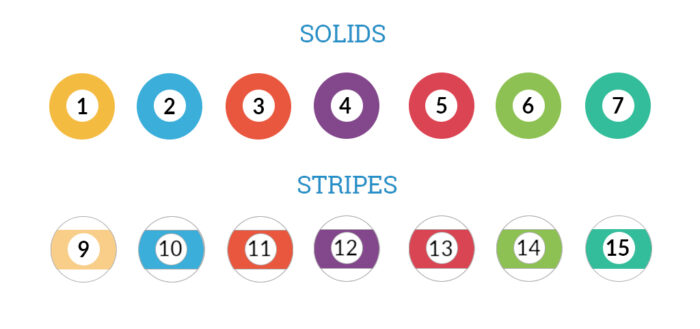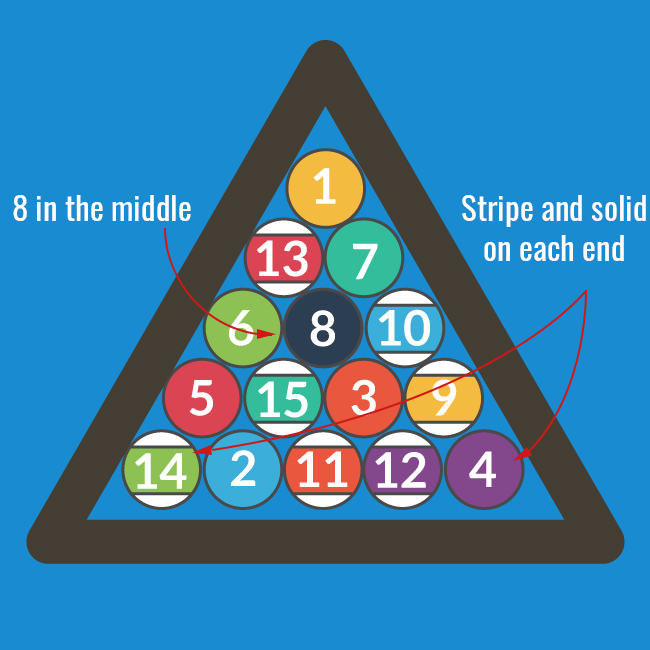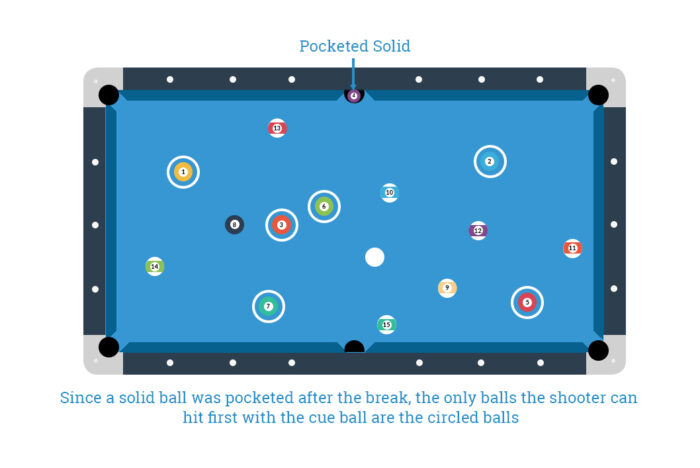8 ball is the most common pool game played in the world. The rules are simple but they’re often disputed which is why it’s good you decided to look them up. However, before starting it’s worth saying that there are no universal rules to 8 ball. The reason why is there is no single governing 8 ball organization, but there are many. Most tournaments have slightly different rules for each event, including top professional tournaments. What exists is a framework of rules (i.e. solids/stripes and 8 ball is the last ball to be pocketed to win), that most players adhere with the details being slightly different between organizations. This means it’s the players’ responsibility to agree on the rules before the game to makes sure both players are on the same page.
So having said that, here are a set of the most basic set of rules you can play by.
Here are the basic rules of 8 ball pool:
Overall Objective
8 ball can be played with two players or teams. The goal of the game is to pocket all of the balls from your assigned group (solid or striped), and then pocket the 8 ball to win the game.

Racking the balls:
All 15 balls are racked in a triangle formation at one end of the table. The 8 ball should be placed in the center of the rack, with one solid-colored ball and one striped ball on each side of the bottom row of balls. The remaining balls can be placed in any order.

The Break:
The player who breaks the rack must hit the balls with the cue ball from behind the head string. The break is legal as long as four balls hit a cushion (including the cue ball) or a ball is pocketed.
If a ball is made on the break, the shooting player can continue shooting. If no balls were pocketed, then it’s the opponents turn to shoot.
Choosing a group after the break:
After the break the table is open, and the player at the table can decide which set of balls (stripes or solids) to pocket. Once the player pockets a ball, the type of ball pocketed is now the group belonging to that player for the game.
If the player tries to pocket a ball and misses, the table is still open and the incoming player can decide which group to take by pocketing a ball from that group.

Continuing play:
For which ever player has control of the table, they can continue their turn after each successive ball is pocketed. This includes the break. The player who successfully pockets a ball on the break gets to continue shooting. If no balls are pocketed on the break, the other player takes over. During regular play if the player at the table misses a ball, then their turn is over and it’s their opponents turn at the table.
Foul penalties:
Fouls result in the loss of turn and ball in hand for the opposing player.
Winning:
The game is won by pocketing the 8 ball after all of your assigned group’s balls have been pocketed. The pocket the player decides to pot the 8 ball into must be called in order for it to be a legitimate shot. If the 8 ball goes into a pocket other than the one called, the player loses the game.
Losing Early:
If a player does any of the following, it results in a loss of game for that player:
- Pockets the 8 before all the balls in their group are pocketed
- Scratches on the final shot of the game, while making the 8
- Jumps the 8 ball off the table
Scratching on the break:
If you scratch on the break, it is considered a foul. When a player scratches on the break, the following happens:
- It is not considered a legal break: If a player scratches on the break, it is not considered a legal break, even if they have pocketed one or more balls. This means that the opposing player can choose to re-rack the balls and take the first shot, or they can choose to continue the game with the current ball positions.
- The opposing player gets ball in hand: After a scratch on the break, the opposing player gets ball in hand. This means that they can place the cue ball anywhere on the table before taking their shot.
Fouls in 8 ball:
A foul occurs when a player fails to follow the rules of the game. Here are some actions that can result in a foul:
- Failing to hit any balls: If a player takes a shot and fails to hit any of the balls on the table, it is considered a foul.
- Pocketing the cue ball: If a player pockets the cue ball, it is considered a foul. When this happens it’s referred to as a scratch and the opposing player gets ball in hand, which means that they can place the cue ball anywhere on the table before taking their shot.
- Hitting the wrong ball with the cue ball without first hitting a ball in their group: If a player hits the cue ball and it doesn’t make contact with a ball within the players group before hitting a ball in the opponent’s group then it is a foul and the opponent gets ball in hand.
- Hitting the 8 ball first: If a player hits the 8 ball with the cue ball before hitting any of their designated group of balls, it is considered a foul.
- Failing to hit a rail: If a player takes a shot and no balls hit a rail (i.e., the cushion around the edge of the table) after the cue ball comes in contact with an object ball, it is considered a foul.
- Touching a ball: If a player touches a ball with their hand or cue while taking a shot, it is considered a foul.
- Taking a shot out of turn: If a player takes a shot when it is not their turn, it is considered a foul.
Main rules to discuss before playing
Call shot: The final 8 ball is always call shot in that the player must call the pocket before pocketing the ball. However, you can decide to play every shot this way. In this case, if every shot is call shot and a player makes a ball into a pocket they didn’t call, then their turn is over and the other player gets to shoot. It is not a foul to pocket a ball in the incorrect pocket.
Accidentally disturbing balls: People often disagree about how to handle accidentally touching an object ball with your body or with a part of the cue. The two most common types of ball fouling rules are
- All Ball Fouls – if a player disturbs any ball while not during a legitimate shot, then it’s a foul and the opponent gets ball in hand.
- Cue Ball Fouls only – if a player disturbs the cue ball while not during a legitimate shot, then it’s a foul and the opponent gets ball in hand. If an object ball accidentally does get disturbed then it’s the non-shooting players choice on whether to leave that ball in the current position or decide to move it back to the original position according to their discretion.
Common Myths Related to Rules
You lose if you scratch on the break you lose:
This is an often misquoted and misunderstood rule. If you scratch on the break, that’s not an automatic loss. That’s a foul and the opponent would take ball in hand.
However, if you make the 8 ball off the break and scratch, that would result in a loss of game. Conversely, making the 8 on the break and not scratching would result in a win.
Hitting the cue ball 3 rails:
This is a bar room rule you can hear in certain places. This isn’t an 8 ball pool rule, but likely originates from conflating carom based games without pockets which sometimes require hitting 3 cushions in order to make a point. No 8 ball billiards organizations recognize this as a legitimate rule. If the cue ball doesn’t hit an object ball after hitting 3 cushions that is still a foul and results in ball in hand.
Call shot vs. call pocket:
For the purposes of this post, call shot refers to a player calling the pocket they want to pocket an object ball. However, some players interpret call shot to mean that a player must call very specific elements of the shot in addition to calling the pocket. Details like the object ball with hit the center of the pocket and not the edges of it. Or the cue ball will hit another object ball after making the ball. This interpretation of call shot is nonsense. No billiards organization thinks of call shot in this way and it’s frankly an opponents attempt to get an unfair advantage against you in their favor you in most cases.
Please dispute any interpretation of call shot not meaning calling the pocket vs. calling every detail of the actual shot.
